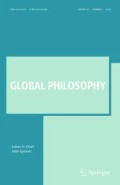Abstract
In his 1896 lecture course on logic–reportedly a blueprint for the Prolegomena to Pure Logic–Husserl develops an explicit account of logic as an independent and purely theoretical discipline. According to Husserl, such a theory is needed for the foundations of logic (in a more general sense) to avoid psychologism in logic. The present paper shows that Husserl’s conception of logic (in a strict sense) belongs to the algebra of logic tradition. Husserl’s conception is modeled after arithmetic, and respectively logical inferences are viewed as analogical to arithmetical calculation. The paper ends with an examination of Husserl’s involvement with the key characters of the algebra of logic tradition. It is concluded that Ernst Schröder, but presumably also Hermann and Robert Grassmann influenced Husserl most in his turn away from psychologism.
Similar content being viewed by others
Notes
Husserl writes in 1895, 1896 (Husserl 2001a, 241), and in the Prolegomena (§21) that arithmetic and logic should not be distinguished. His formulation from 1895 is “Und so werden wir uns mit der zunächst wohl befremdlichen Auffassung Lotzes befreunden müssen, dass die Arithmetik nur ein relativ selbständiges und von alters her besonders hoch entwickeltes Stück der Logik sei”(ibid., 271–272). This should not be understood in the sense of Fregean logicism as a claim that arithmetic should be reduced to logic, but rather in the sense that for Husserl logic has an algebraic form that can also be found in arithmetic.
Die sinnliche Fülle der Anschauung, das frische pulsierende Leben des Individuellen, das unserer unmittelbaren Teilnahme sicher ist, geben wir freilich auf, wenn wir uns zum Abstrakten erheben. Aber ohne Abstraktion kein Begriff, ohne Begriff kein Gesetz, ohne Gesetz keine Einsicht aus dem Grunde, keine Theorie, keine Wissenschaft, und ohne Wissenschaft keine Philosophie. Die entsagungsvolle Abwendung von den grünen Tälern und Gefilden des Lebens zur grauen, ledernen, nüchternen Theorie ist eben das einzige Mittel, um unsere höchsten und reinsten Erkenntnisinteressen zu befördern.
Rollinger (2003) argues against Mohanty’s view that “[i]t would certainly be amiss to say, along with one of the most prominent commentators [Mohanty] on Husserl’s work in logic, that the later motifs of his transcendentalism, such as the view that ‘scientific objectivities are idealization of the life-world,’ were already present in his early logic”(p. 200). Given the quoted passage, Mohanty’s conception appears rather well grounded.
In German: “gehört nicht in das allgemein logische Gebiet, er ist eingeschränkt auf das Gebiet der Gröβen”(2001a, 239).
Husserl also owned many books by Robert Grassmann: Formelbuch der Denklehre, Die Logik und die andern logischen Wissenshaften, Formelbuch der Formenlehre oder Mathematik and all the published parts of the Das Gebäude der Wissenschaften (Husserl 1994a, 159). However, most of them are not cut open. Only the “Denklehre” (the first part, second half of ‘Gebäude des Wissens’) is completely opened, of the other volumes only the preface is cut open (I owe this information to Carlo Ierna at the Husserl Archives, Leuven).
References
Beyer C (1996) Von Bolzano zu Husserl. Kluwer, Dordrecht
Centrone S (2010) Logic and philosophy of mathematics in the early Husserl. Synthese Library, vol 345. Springer, Berlin
Grassmann R (1872) Die Formenlehre oder Mathematik. Stettin
Husserl E (1891) Philosophy of arithmetic. (trans: Willard D), Kluwer, Dordrecht, 2003
Husserl E (1994a) Briefwechsel. Band VI. Philosophenbriefe. Kluwer, Dordrecht
Husserl E (1994b) Briefwechsel. Band VII. Wissenschaftlerkorrespondenz. Kluwer, Dordrecht
Husserl E (1994c) Early writings in the philosophy of logic and mathematics. (trans: Willard D), Kluwer, Dordrecht
Husserl E (2001a) Logik. Vorlesung 1896. In: von Elisabeth Schuhmann (hg) Husserliana Materialienbände, BD. I. Kluwer, Dordrecht
Husserl E (2001b) Logical investigations (trans: Findlay JN), Moran D (ed), vol I. Routledge, London
Miller PJ (1982) Numbers in presence and absence: a study of Husserl’s philosophy of mathematics. Martinus Nijhoff, The Hague
Mohanty JN (2008) The philosophy of Edmund Husserl. A historical development. Yale University Press, New Haven
Peckhaus V (1996) The influence of Hermann Günther Grassmann and Robert Grassmann on Ernst Schröder’s algebra of logic. In: Schubring G (ed) Hermann Günther Graβmann (1809–1877): visionary mathematician, scientist and neohumanist scholar. Kluwer, Dordrecht, pp 217–227
Peckhaus V (2004a) Schröder’s logic. In: Gabbay DM, Woods J (eds) Handbook of the history of logic, vol 3. Elsevier BV, Amsterdam, pp 557–609
Peckhaus V (2004b) Calculus ratiocinator versus characteristica universalis? The two traditions in logic, revisited. Hist Philos Logic 25:3–14
Rollinger R (2003) Husserl’s elementary logic. The 1896 lectures in their nineteenth century context. Studia Phaenomenologica 3(1–2):195–213
Schuhmann K (1977) Husserl-Chronik. Martinus Nijhoff, The Hague
Van Heijenoort J (1967a) From Frege to Gödel, a source book in mathematical logic 1879–1931. Harvard University Press, Cambridge
Van Heijenoort J (1967b) Logic as calculus and logic as language. Synthese 17:324–330
Author information
Authors and Affiliations
Corresponding author
Rights and permissions
About this article
Cite this article
Hartimo, M. Husserl and the Algebra of Logic: Husserl’s 1896 Lectures. Axiomathes 22, 121–133 (2012). https://doi.org/10.1007/s10516-011-9166-8
Received:
Accepted:
Published:
Issue Date:
DOI: https://doi.org/10.1007/s10516-011-9166-8




